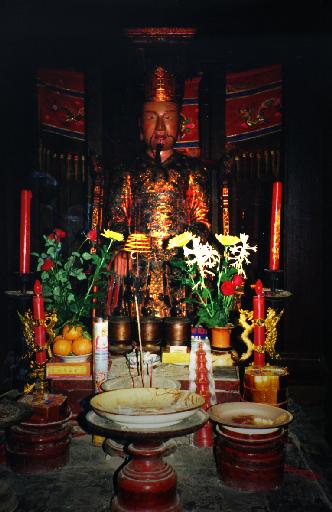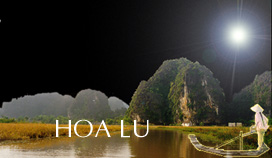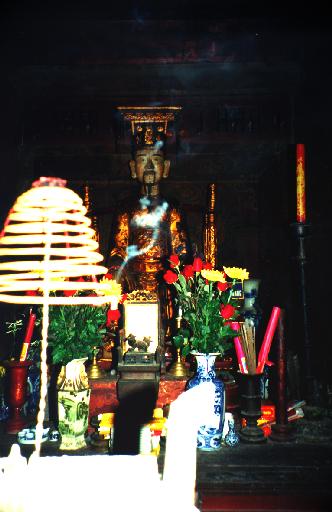| One
speaks rarely of Dương Vân Nga in the history of Vietnam. Her name is
not as often cited as that of the sisters Trung Trac Trung Nhi or that
of Trieu Au. However she was an outstanding woman, the great queen of
the first two dynasties Đinh and Tiền Lê ( anterior Lê ) of Vietnam.
Her life and works can be summed up in the following four verses which
have been transmitted by oral tradition to our days and left on the
wall of Am Tien monastery by a mysterious monk exactly 1000 years now,
at his encounter with Dương Vân Nga:
Hai vai gồng gánh hai vua
Hai triều hoàng hậu, tu chuà Am Tiên
Theo chồng đánh Tống b́nh Chiêm
Có công với nước, vô duyên với đời
Among
the ten queens of these two dynasties, she was the only one to be
allowed a statue bearing her effigy. During its restoration and
transfer in the temple dedicated to King Lê Đại Hành at the beginning
of the Hậu Lê dynasty the statue oozed strangely, perhaps due to it
being exposed suddenly to the sun after having been put in a humid
place. At that time, it was said that this phenomenon was attributed
to atrocious sufferings life has reserved to Dương Vân Nga during her
lifetime.
Her real
name was Dương Thị. Vân Nga was the name attributed to her by
combining the first word of the name of the region of her father Vân
Long and that of her mother Nga Mỹ. She was issue of a very poor
background. At her very young age she had to collect wood in the
forest and fish in the river to provide to the subsistence of her
family in a mountainous and uneven region which is our Hoa Lư.
Early morning in the forest, late evening in the river, she became
without delay a young hard working, energetic and trouble shooting
girl. She had an innate sense of organization that allowed her to
become in the following years the leader of a band of young girls in
the area. She arrived at coping with a rival band constituted mainly
of young boys led by the buffalo tender Đinh Bộ Lĩnh by completely
disperse his herd of buffaloes by using firecrackers and by her
perfect mastery of round floating baskets that helped rapid transport
of her troops across swamps and streams. But Dinh Bo Linh finally had
the last word thanks to his scheme of recourse to poles and light
craft of bamboo mat to pierce and immobilize all the round floating
baskets of Dương Vân Nga. From then on Đinh Bộ Lĩnh not only conquered
Duong Van Nga's admiration but also her love. That is why nowadays to
evoke conjugal union and predestined love of a couple, it is often
referred to the following popular expression: Bamboo mat craft crush
round floating baskets ( Thuyền tre đè thuyền thúng)
 Đinh Bộ Lĩnh's altar ( Hoa Lư )
Đinh Bộ Lĩnh's altar ( Hoa Lư )
Thanks to their association, they
arrived at gathering under their banner all the young of Hoa Lu and
eliminating without delay their opponents in the conquest of power.
Thus Đinh Bộ Lĩnh became the first king of the Đinh dynasty often
known as Đinh Tiên Hoàng. He was very authoritarian. He used ranks and
appointments to buy loyalty of his subordinates. He also used force
and cruel and unimaginable punishments to punish his adversaries and
those who dared criticize him.

Despite Dương Vân Nga's advice, he remained unruffled and made several
enemies to himself even in his family. Instead of appointing his
eldest son Đinh Liễn, the one who had helped him for several years in
his fights for the unification of the country, he chose his youngest
son Đinh Hạng Lang as his crown prince. This provoked Đinh Liễn's
jealousy and incited him to assassinate his younger brother. Dương Vân
Nga was at first witness of the fratricidal fight among her children,
then the death of her husband, king Dinh Tien Hoang assassinated by Đỗ
Thích a crank who, after a dream, thought the kingdom should belong to
him and the eldest son Đinh Liễn killed by the rebel troops. She soon
had the pains and sufferings of her daughter, princess Phật Kim,
deserted by her husband Ngô Nhật Khánh who, being one of the sons of
Ngô Quyền, took refuge in Champa and requested this country to launch
a maritime attack against his own land Vietnam in the goal of
reconquest of power. Because of the age of her son Đinh Toàn ( 6 years
old ), she had to assume the regency with Lê Hoàn, a generalissimo,
head of Vietnamese territories. |
But she soon faced the armed resistance of her assassinated husband's
partisans who wanted to eliminate Le Hoan at any cost and also the
imminent threat of the Song as well as Champa's. She was placed in
front of a dilemma that appeared to be difficult for a woman to
overcome alone when she lived in a Confucian era and when Vietnam was
just liberated from Chinese domination for about a dozen years. She
had the courage to take a decision which appeared doubtful at that
time and heavy of harmful consequences for the Dinh dynasty in
yielding the throne to Le Hoan and associating with the latter in
managing the Đại Cồ Việt ( ancient Vietnam ).
Lê Hoàn's altar ( Hoa Lư )

This permitted Lê Hoàn to have
a massive adhesion of a great part of population and restore not only
the confidence but also the unity of the whole people. He thus
succeeded in putting down the rebellion, wiping out the Song on the
Bạch Đằng river, starting the Nam Tiến movement ( or descent toward
the South ) and restoring peace all over the country. One should place
oneself in this troubling political context that Dương Vân Nga
experienced in order to see that it was an act well thought out and
courageous from the part of a woman who, trained up until then to be
submissive to a Confucian yoke, dared accept the dishonor and scorn to
assure that our country would not pass under Chinese domination and
that Vietnam would not prolong in political chaos. Her combat appeared
to be more arduous than that of the Trưng Trắc Trưng Nhị sisters
because it is the matter of not only a struggle against the invaders,
but also her own interests, her personal sentiments for the love of
this country.
During the reign of Lê Đại Hành ( or
Lê Hoàn ), she ceaselessly advised the latter to practice a politics
of magnanimity towards his adversaries, to ban cruel punishments
established by Đinh Tiên Hoàng and to call on talented monks (Khuông
Việt, Ngô Chấn Lưu, Hồng Hiến, Vạn Hạnh) to the management of the
country. Being a warrior by nature, bearing the name of Great
Expedition ( Đại Hành ), he continued to enlarge Vietnam by leading
not only a maritime expedition that destroyed the Cham capital
Indrapura in presently Central Vietnam in 982 and killed the Cham king
Bề Mi Thuế ( Paramec Varavarman ) but also a politics of pacification
all over the place in the ethnic minority territories. It was in one
of these battles that the last son of Dương Vân Nga and Đinh Tiên
Hoàng, Đinh Toàn, died assassinated at the place of Lê Hoàn by the Mán.
This death was followed by the suicide of her daughter, princess Phật
Kim and the death by illness of her son Long Thâu that she had with Lê
Đại Hành. She was taken up by the disappearance of her entourage
without complain. She preferred to live her last days in Am Tiên
monastery and burry the personal sufferings of a woman facing her
destiny.
Is it fair for a patriotic
woman like Dương Vân Nga overwhelmed by destiny, not to be cheered and
cited like the Trưng Trắc Trưng Nhị sisters in the history of our
Vietnam? Is there anything to do with a deliberate omission because of
a sacrilege committed by Dương Vân Nga for having married and served
two kings in a feudal Confucian society which is ours? One cannot
erase the truth of history especially these details, said the Chinese
historian Si Ma Qian. It is time to give back to Dương Vân Nga her
notoriety and her place she deserved long time ago in our history
pages and make known to future generations the courageous and full of
wisdom decision. This one, even though it seemed doubtful and immoral
for a Confucian society, was made in the moment where the situation
exacted more than ever the cohesion and unity of the whole people
facing foreign invasion, but also a man of valor and talent that was
our great king Lê Đại Hành. Without him, the
Nam Tiến
movement would not have taken place.
|
